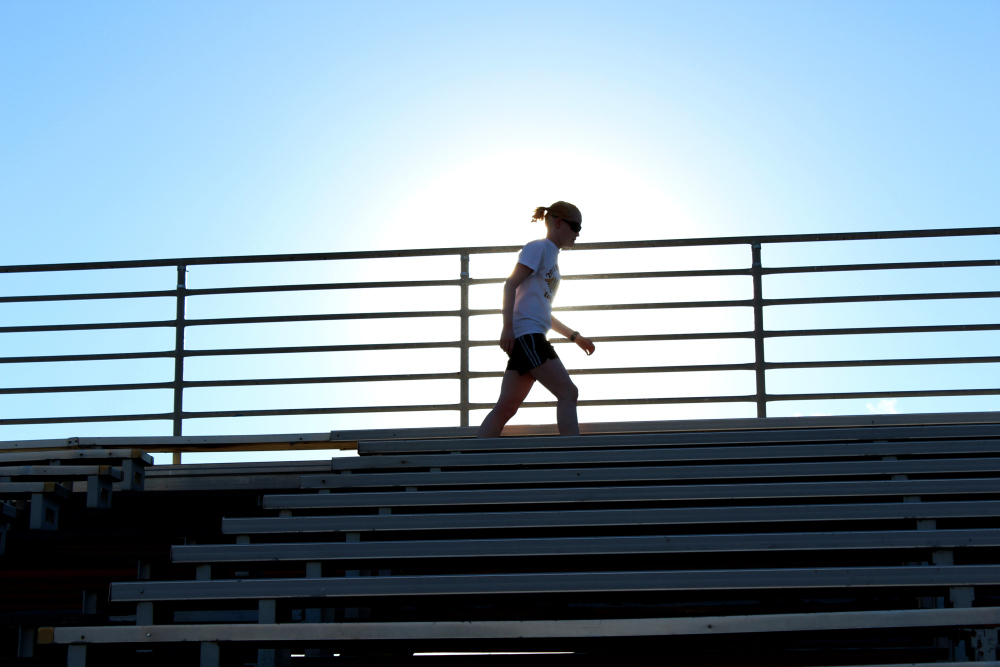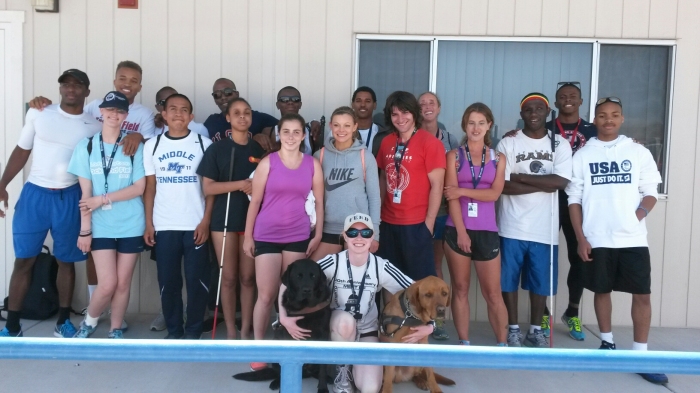Chico State Runner Competes for Spot on Paralympic Team

Kym Crosby trains at University Stadium earlier this year. Crosby, who is legally blind, has been invited to live and train at the U.S. Paralympic Training Center this summer.
By Quinn Western, social media and photography intern
At the conclusion of Kym Crosby’s 200-meter race at an international track meet in Arizona, her body felt good, but she didn’t think she performed all that well.
But when she went to check her time, it was 25.4 seconds—her best time all season and .1 seconds off her personal best.
“When I saw my time, I had to keep going back to recheck it and check that it was the right time with the right name,” she said.

Her times in the 100 and 400 meter weren’t as low as she would’ve liked, but that didn’t put a damper on her excitement about her time in the 200. She just wanted to show the coaches and Paralympics representatives that she could deliver.
“Just show them that I can run, that I can do well, even under that kind of pressure,” Crosby said.
She flew to this meet in early May to get internationally classified and see official eye doctors associated with the Paralympics committee.
Crosby is albino and legally blind. This means she doesn’t have pigment in her hair, eyes, or skin.
She first started running in high school. Her brother suggested it because she was fast and able to see the lines on the track. Crosby never thought she’d be able to run at the collegiate level.
Now she is a third-year athlete on the Chico State women’s team, and she recently returned from a week at the U.S. Olympic Training Center in Chula Vista. She trained alongside Olympians and Paralympians, hoping to compete for a spot on the 2016 Paralympics team. Only 15 potentials were invited to train for the week.

The training was geared toward runners with visual impairments. It consisted of one-on-one starting and finishing tips, meetings with a sports psychologist, and information about diet and nutrition.
They practiced twice a day, attended meetings about the Paralympics process, and got to enjoy the all-you-can-eat cafeteria with the other Olympians, many of whom are paid to live there.
All of the outdoor Olympic sports are located at this facility.
“There’s awesome equipment that you would only see in movies,” she said.
Crosby wasn’t the only one enjoying the toys. Her guide dog, Keystone, became buddies with another service dog, bonding over chewing a plastic cone.

“He’s always by my side,” she said as he was sleeping under her bed.
In Chula Vista, she met the track coach for both the Olympians and Paralympians, who told her that she’s a good runner on track to compete in the 2016 Paralympic Games in Rio.
After the week, Crosby returned to Northern California, expecting to train in Chico and in her hometown, Yuba City.
But her plans changed as fast as she is on the track.
The Paralympics director and coach have invited Crosby to live at the Olympic campus this summer. She is the only athlete among her group of 15 who was invited back.
After this summer, she will continue to compete as a Wildcat and in big meets including the 2015 World Championships in Doha, Qatar. Next year is when the Rio team really starts to come together.
“I never would’ve ever thought that I would’ve come to this point,” Crosby said. “All of the hard work that I have put in, I’m really now starting to see it pay off.”


